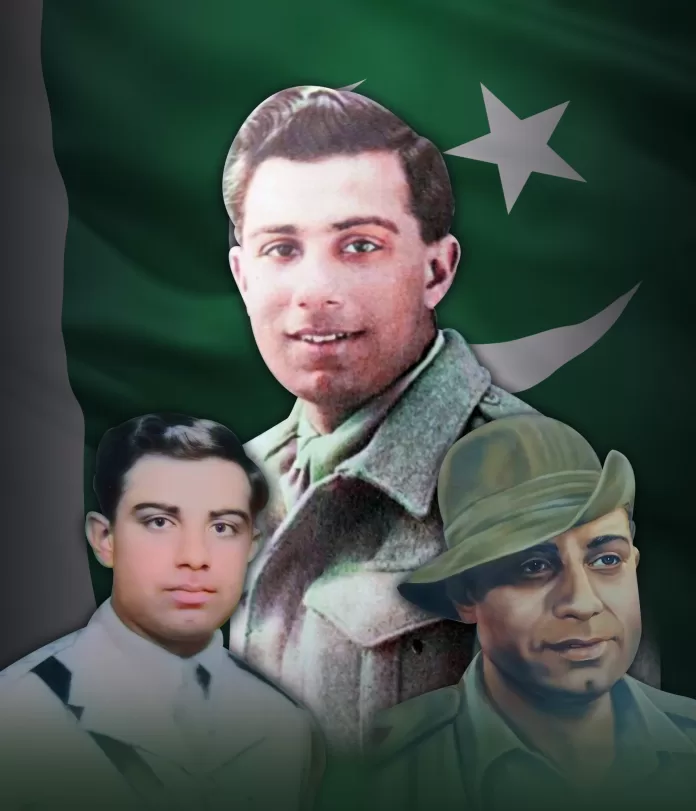Every good son looks up to his father, I always had a great admiration for mine, late Lt Col Abdul Majeed Sehgal. However, it was not till after his death that I found that this tremendous human being was also an outstanding soldier with command experience post 1947 in actual combat. It was only after his death on opening his steel trunk containing his stored documents that I discovered how self-effacing he was, certainly not given the recognition he deserved, both as a professional soldier and in his civilian life.
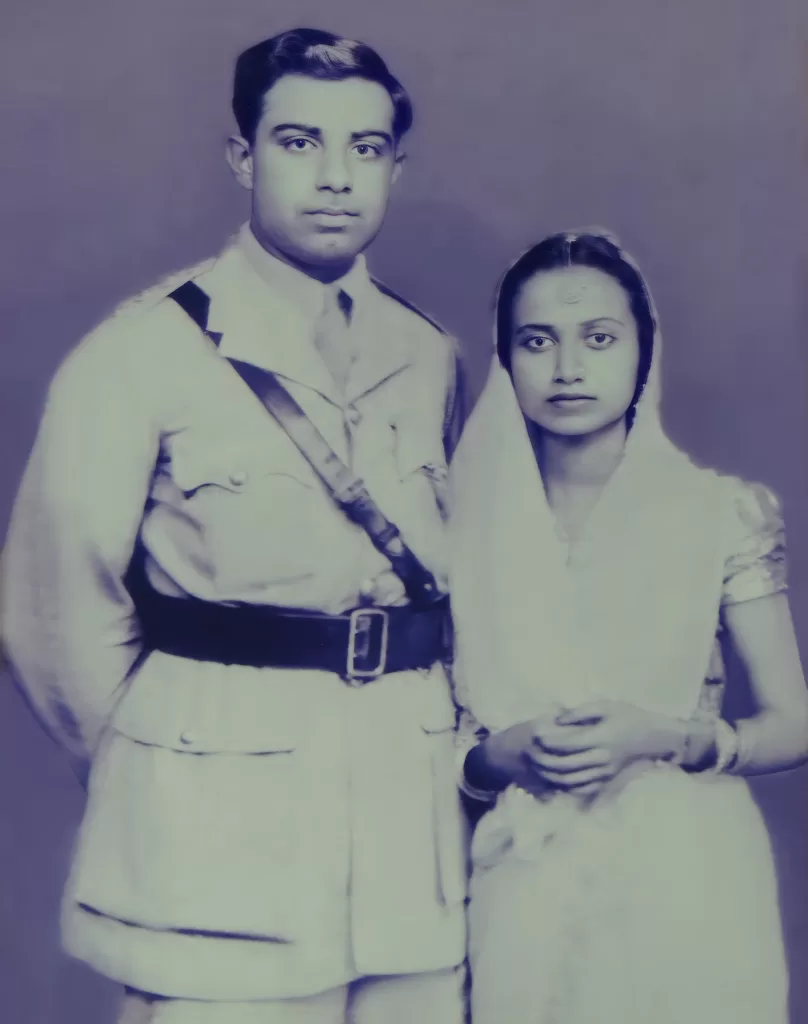
And he never talked about it! This could be because his spouse was not from the right “race”. As a Punjabi he married into one of the most respectable families of Bengal in 1944 in Calcutta (Huseyn Shaheed Suhrawardy and Secretary General of PPP J A Rahim were cousins of my maternal grandmother while Mohammad Ali Bogra was a cousin of my maternal grandfather). Both Suhrawardy and Mohammad Ali Bogra became PMs of Pakistan in the 1950s whereas as the Secretary General PPP (and ZA Bhutto’s Federal Minister for Presidential Affairs and Production) JA Rahim was the architect of the PPP manifesto that led to ZA Bhutto’s ascent to power (on the socialist slogan “Roti, Kapra aur Makaan”).
Having brought 2 companies of 7/16 (now 19) Punjab from Bengal to Sialkot after independence in 1947, my father faced his mother’s wrath on bringing also his Bengali wife home to Sialkot. To avoid continuing family confrontations, he opted out of a possible comfortable civilian life with real estate inheritance in Sialkot and chose instead to soldier on in the Army (and away from Sialkot) which he started to love as the above par professional he was. Till she died in 1958 my paternal grandmother, who showered love on both my sister and me, did not reconcile with my mother, so deep-rooted was the prejudice.
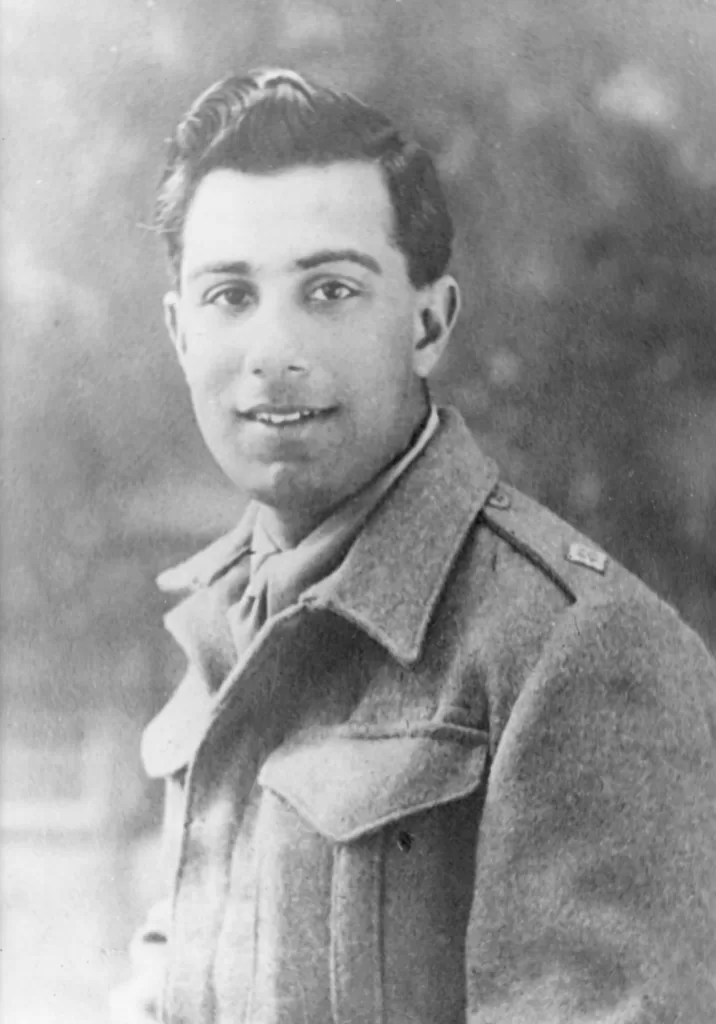
The British had disbanded the Bengal Native Army including the Infantry and Cavalry units after the 1857 War of Independence. Therefore there were no Bengali units in Pakistan on independence. My mother being Bengali my father was the odds-on choice to raise (as a Major) the second unit of the East Bengal Regiment (the BENGAL TIGERS) in Kurmitola, Dhaka in February 1949, my father was sent with about 100 soldiers from 19 Punjab (JCOs, NCOs and ORs including drivers, cooks, barbers, etc) only a few weeks after my sister Shahnaz’s birth in Sialkot Cantt on 24 January 1949 (incidentally she is buried in the Bonani graveyard in Dhaka having died in a medical accident at the age of 28 in 1977). Several months later in September 1949 he handed over command of the second Battalion of the East Bengal Regiment (the Junior Tigers) to Lt Col Zahiruddin who become the first CO of 2 E Bengal.
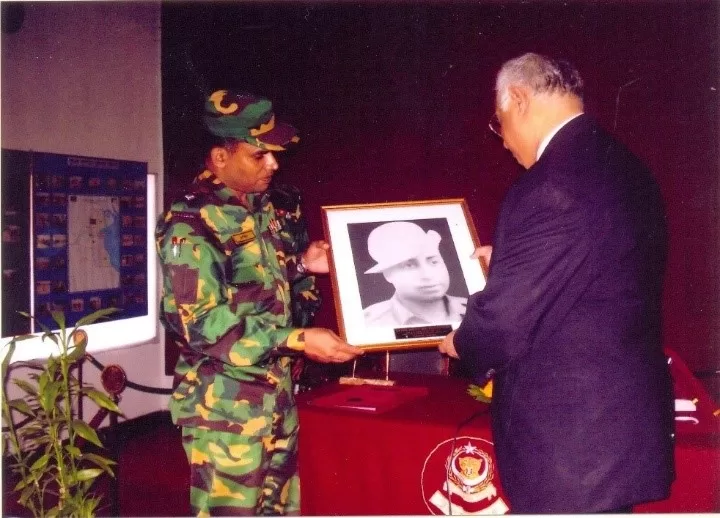
After qualifying extremely well from Command and Staff College Quetta in 1952 he went on to become the Brigade Major (BM) of 53 Brigade (in which 2 E Bengal was now part of in Comilla) in 1953. After serving as GSO-2 (Intelligence) 14 Div, in Dhaka, he did a two-year stint as Instructor in Command & Staff College Quetta. He was given Command of 2 E Bengal in 1956. During this period there was huge smuggling of raw jute to West Bengal which had over a 150 jute mills based mostly on East Bengal’s raw jute. Maj Gen Umrao Khan GOC 14 Div planned OPERATION CLOSE DOOR to stop the outward flow of raw jute and rice. With his unit 2 E Bengal and alongwith 2 companies of 2 FF my father was tasked under Brig (later Lt Gen) Attiqur Rahman then Comd 53 Bde, to close down the Comilla, Sylhet and Chittagong borders. Capt (later Gen and Chairman Joint Chief of Staff Committee) Mohammad Iqbal Khan of 2 FF was the Adjutant for the Task Force. OPERATION CLOSE DOOR resulted in the closure of at least 50 jute mills in Calcutta and the establishment of about 35-45 new jute mills in then East Bengal (now Bangladesh). I am sure the inadvertent military architect of Bangladesh’s jute industry Maj Gen Umrao Khan and (then) Brig Attiqur Rahman (who was originally 6 FF but loved 2 EB) do not figure at all in Bangladeshi history. To quote Shakespeare’s Mark Antony at Julius Caesar’s funeral “The good that men do is oft interred with their bones, the evil lives after them”. When I visited 2 E Bengal in Dhaka in 2008 the CO who was born in 1971 gave me my father’s photograph duly signed by all officers of the unit.
After serving for 4 years in GHQ from 1958 to 1961 my father was posted as Commander Sylhet Sector EPR. In 1962 he was made Commander of a Task Force for OPERATION KICK OFF consisting of 5 companies of East Pakistan Rifles (EPR) and 2 companies of 6 FF in Oct 1962 to evict an Indian Battalion Plus consisting of Indian Army and BSF troops that had dug fortified positions south of the Asalong River (sometimes labelled as Feni River) near Asalong Mouza in the Chittagong Hill Tracts. The EPR Companies that took part in OPERATION KICK OFF became known as the “ASALONG Battalion”. Edited by Col (Retd) Nusrat Ullah (formerly 24 Cav) the War Diary of the entire episode (and also my father’s personal diary) is being reproduced in DJ in this issue. An UNSUNG HERO for many reasons, my father’s only real handicap was that he was married to a Bengali – and that too from a political family. The racial prejudice against Bengalis led to 1971.
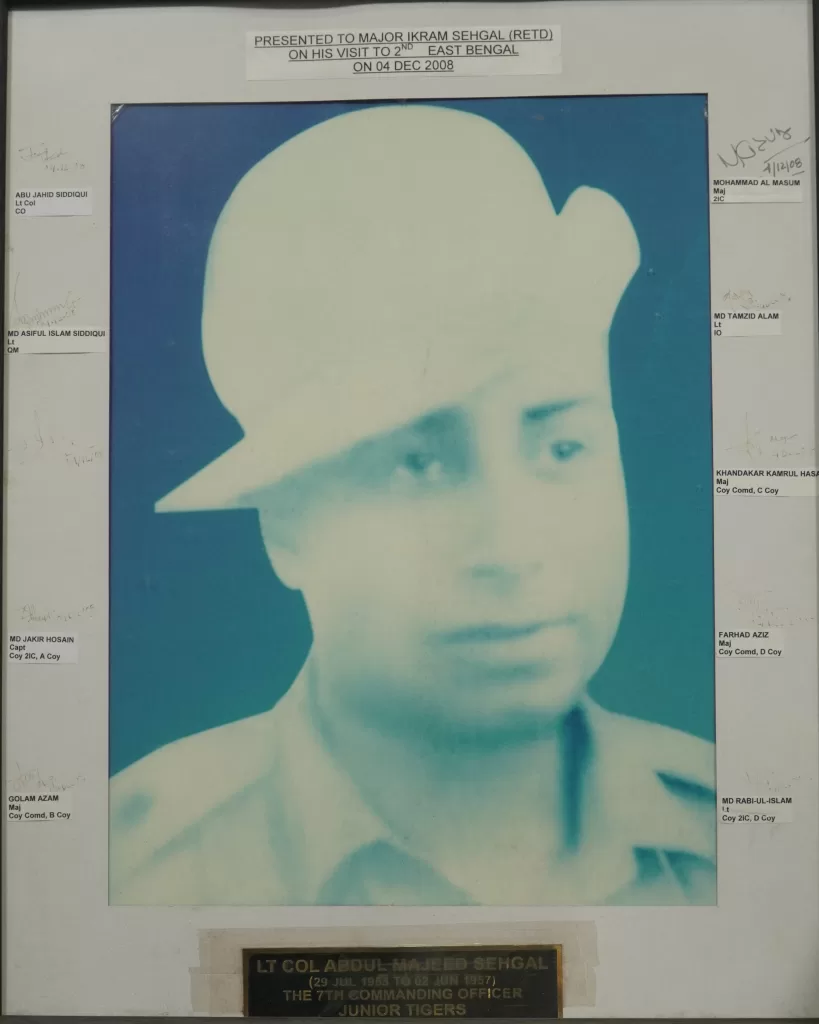
My father was no less a HERO for warding off continuous persuasion from family, friends and colleagues to separate from my mother pre-1971 and post-1971. I start my day in Karachi every morning saying Fateha at their graves, both buried besides each other in the compound in Abdullah Shah Ghazi’s MAZAR in Clifton, Karachi. When my father died in August 1983, his former Adjutant in 2E Bengal Gen Ershad President of Bangladesh, requested my mother to come to Bangladesh and claim the properties which had been confiscated because she was Pakistani citizen. She flatly refused and said she was a Pakistani by choice and would die as a Pakistani, choosing to be buried next to her husband in Karachi. She stubbornly collected her meagre Pakistan military’s widow’s pension (with which she bought gifts for her grandchildren) rather than go back to Bangladesh and claim her properties worth millions and millions. I am proud that my parents made the right sacrifices for the right reasons.
Some key targets of the Federal Budget for FY 2024-25 presented by Finance Minister Muhammad Aurangzeb on June 12 include a GDP growth target of 3.6pc, inflation at 12pc, and a budget deficit at 5pc of GDP. Featuring a record-high deficit of Rs8.5 trillion, this budget is largely perceived to align with the International Monetary Fund (IMF) guidelines. The budget expects an increase in tax revenue by 37.8 per cent, increasing the tax-to-GDP ratio to 10.4 per cent – a tall ask, as rarely has growth in tax revenue been in this range. With expected inflation around 12 per cent, implying a growth in tax revenue by around 22 per cent in real terms it is rather optimistic to expect an increase in tax revenue by a whopping 38 percent, then increasing the tax to GDP ratio to over 10 percent, because Pakistan’s growth in tax revenue has rarely been in this range. The expected inflation implies a growth in tax revenue by around 22 percent in real terms, this would be thus quite difficult to attain. In terms of revenue generation, the budget document does not indicate any major change in reliance on indirect taxes, up to 75 to 80 percent of all revenue collected by the Federal Board of Revenue, the burden falling more on the poor than the rich. While the tax rate for the salaried class was not changed, taxing the already burdened part of the formal economy is not a laughing matter, because these are salaried individuals, exporters, importers, listed companies and all other businesses are already registered with the tax authority and are documented. Over the last many years real incomes have declined by more than 30 percent and the current increased incidence of taxation will further erode post-tax income.
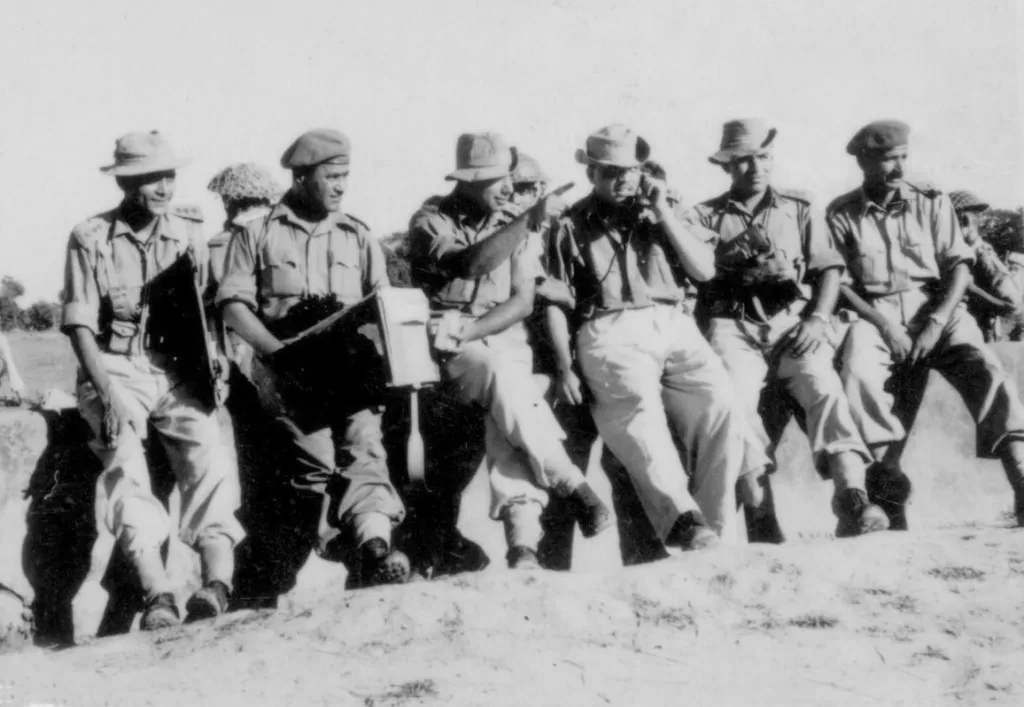
The voiceless salaried class has once again been targeted because of its inability to make as much noise as other rent seeking interest groups. Not surprisingly, the largesse for the untaxed continues at the expense of existing taxpayers. Successive governments have failed miserably by their combined reluctance to end the elite capture of our economy and summon enough courage and resolve to enforce the writ of the state. Another major change is the taxation regime for export-oriented industries, which will further increase corporate tax, while reducing incentive to reinvest. Primarily all increase in direct taxes is largely being borne by existing tax holders, effectively implying a deepening burden on the existing tax base, rather than an expansion of the Base. In defence of Finance Minister Muhammad Aurangzeb, what choices did he have? IMF’s prior conditionalities were confirmed by PM Shehbaz Sharif in the NA on Tuesday June 25, “We had to prepare the budget jointly with the IMF”. His remarks came as Aurangzeb backtracked on the proposed Finance Bill for 2024-25 announcing a significant cut of Rs. 250 billion to Pakistan’s development budget even before approval by Parliament citing the stringent conditions imposed by the IMF. This budget has very rightly come down hard on non-filers introducing a new term “late filers” in order to emphasize timely fulfilling of their tax obligations. However Aurangzeb had to considerably backtrack in this. A series of punitive measures were proposed in the budget to punish individuals and businesses who do not file income tax returns, including the possibility of being barred from foreign travel. This is also hardly likely given their clout! While the government tries to go after the non-filers, the overburdened formal sector will continue to face most of the pain. The many clever ones among us Pakistanis, will seek out innovative ways to evade their tax dues.
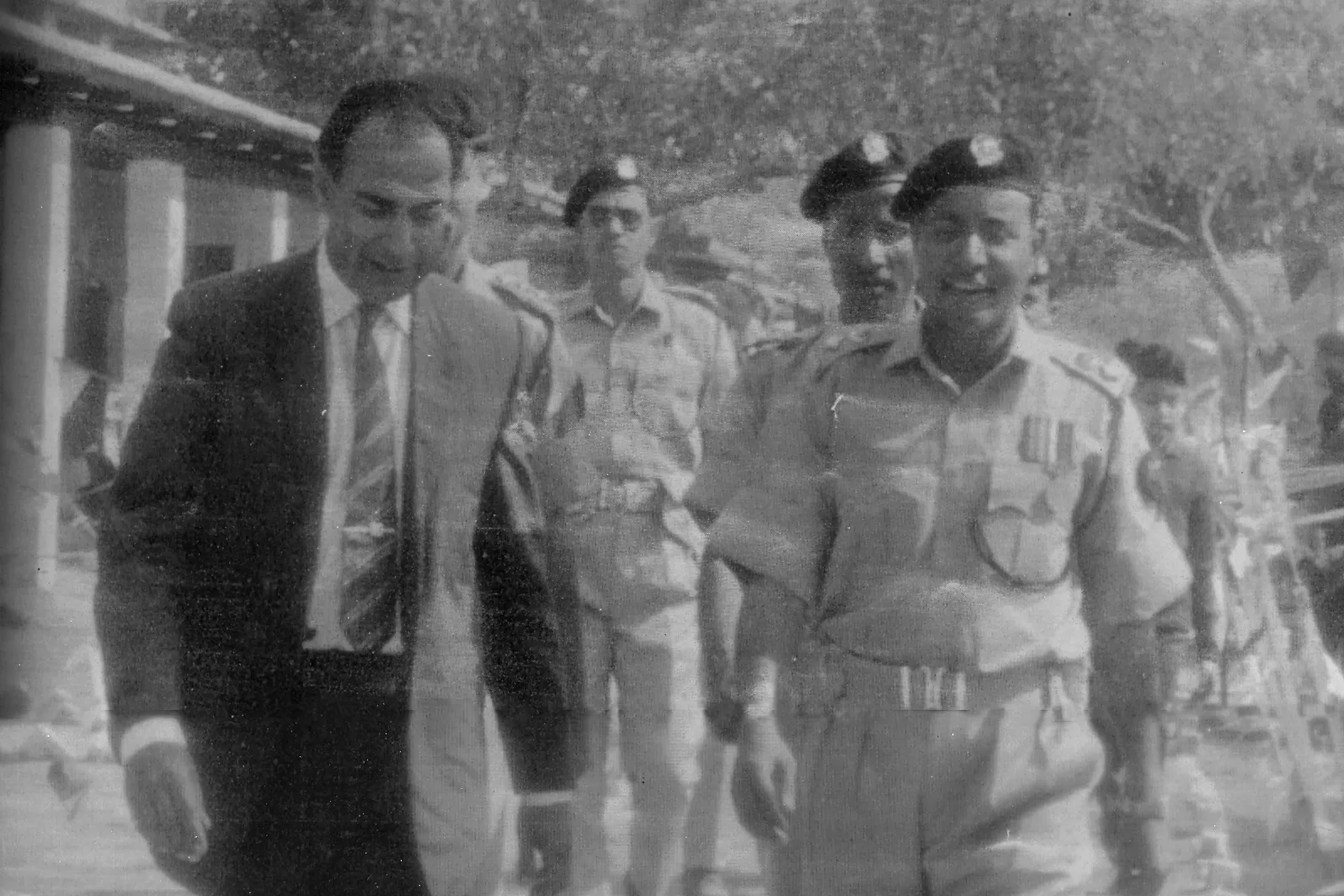
A suggestion to block the sims of non-filers to ensure compliance evoked a backlash from phone companies, their clout was sufficient to scuttle this idea. The IT Industry’s proposals demanding amendments to the Finance Bill were completely overlooked. SBP data shows the country achieved 62 percent year-on-year growth in the sector, achieving an all-time high record of $310 million in inflows. Instead of removing the anomalies in current tax laws, additional taxes have been levied on imports of equipment and GST on hardware has been enhanced from 5 percent to 10 percent. The apathetic lack of interest by government ministers on the Budget presentation was sorely evident by the empty front rows. Federal Minister for Planning and Development, Ahsan Iqbal no other minister was present in the House. However the challenging tax revenue target of Rs. 13 trillion, an almost 40% increase compared to the current year, will go a long way in strengthening Pakistan’s case for a new bailout deal worth US$6 to US$8 billion from the IMF to save the country from possible default.
From the Finance Minister body language, it was clear that he was a reluctant economic “hit man” having to answer to multiple bosses with their own different political agendas. What has been passed vastly differs from the original proposals, will the many changes satisfy the IMF?
IKRAM SEHGAL


